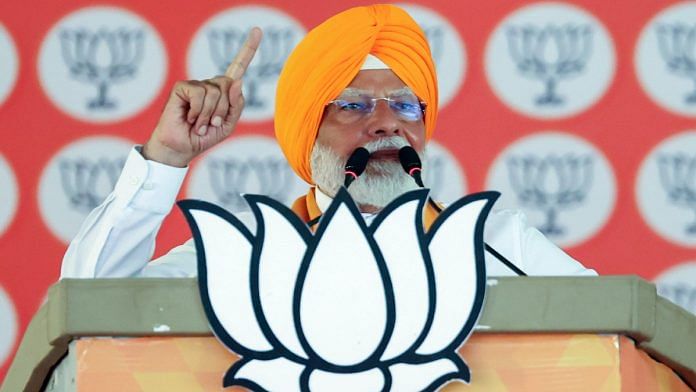New Delhi: Prime Minister Narendra Modi’s comment about Pakistan’s Kartarpur Sahib is an attempt to tap into Sikh sentiments amid the election season but doesn’t hold much water from a legal standpoint, experts say.
“When the Bangladesh war ended more than 90,000 Pakistani soldiers had surrendered and were in India’s captivity. We had the ‘hukam ka patta (bargaining power)’. Had Modi been there then, I would have taken Kartarpur from them (Pakistan) and only then returned their soldiers,” said Modi during an election rally in Patiala Thursday.
“Since that cannot be done, I have served this land of the Gurus in the manner I could and opened the Kartarpur corridor that devotees are able to visit with pride,” he added.
In 2019, India and Pakistan had signed a deal to allow Sikh pilgrims from India visa-free access to visit the Gurdwara Darbar Sahib Kartarpur, also called Kartarpur Sahib.
This gurdwara, considered one of the holiest places of worship in Sikhism, is located in Narowal district, in Pakistan’s Punjab province. It is about five kilometres from Punjab on the other side of the border, in India.
Experts note the political messaging behind Modi’s comment, ahead of the polls in Punjab which are slated for 1 June.
“PM Modi made a political comment. He was responding to the aspirations of the Sikh community such as restoring connectivity, trade and religious tourism across the border,” C. Raja Mohan, Professor, Institute of South Asian Studies at National University of Singapore (NUS), told ThePrint.
Earlier this week, the Shiromani Akali Dal (SAD), in its poll manifesto, touched on the transfer of the Kartarpur Sahib from Pakistan to India through mutual land exchange.
“As a frontier province, Punjab offers unique narratives on partition and India’s relationship with Pakistan — something the mainstream narrative in Delhi often forgets. Amritsar and Lahore were at the heart of the large undivided Punjab province, until they were severed by the Radcliffe Line drawn by the British on short notice,” Prof Mohan further explained.
Incidentally, Modi’s comment in Punjab comes at a time when his government has been accused by Western countries of targeting Sikh separatists on foreign soil.
According to T.C.A. Raghavan, the former Indian High Commissioner to Pakistan, in the aftermath of the 1971 Indo-Pakistan war, “there were many voices in India arguing for gaining more concessions in lieu of returning prisoners of war.”
Speaking to ThePrint, he added, “The perception in Pakistan was that they would not bargain territory for the release of the prisoners of war. It is unlikely that there was a scope for such concessions at the time. It is likely that any speculation of such concessions is for the ongoing elections.”
Also Read: Split by Partition, met in 2022: Story of brothers’ reunion that’s making India-Pakistan cry
‘No precedent nor legal standing’
Though Modi’s comments may have communicated a strong political message, releasing PoWs in exchange for more enemy land or sovereign territory has no precedent, nor is it mentioned in the 1949 Geneva Conventions.
“PM Modi’s comment does not have any legal standing, as far as the extant international humanitarian law (IHL) on prisoners of war goes. It is my understanding that under IHL, equivalences between POWs and territory or bartering one for the other, are looked down upon,” a former Indian diplomat, who has served in the United Nations (UN), told ThePrint.
The Geneva Convention, adopted in the aftermath of World War II, covers the treatment of prisoners, conditions of captivity, hygiene and medical attention and more.
According to Part IV, Section 2 Article 110, release and repatriation of prisoners must take place upon cessation of hostilities.
Specifically on repatriation, the Geneva Conventions makes it clear that prisoners detained in connection with a judicial prosecution or conviction, can only be directly repatriated or accommodated in a neutral country. This is the only such mention of a “special agreement” regarding captives.
“To my knowledge, there’s no historical precedent for the use of prisoners of war as a bargaining chip for capturing more enemy land. The Geneva convention is also silent on any such exchange. Usually, prisoners are only exchanged for other prisoners,” said Rukmini Das, a lecturer in international dispute settlement at the Graduate Institute, Geneva.
“However, it’s possible that in certain diplomatic negotiations, such options are discussed,” she added.
Territorial exchanges
Prisoner swaps are common in conflict zones and major powers, such as the US and Russia or the Soviet Union, have routinely carried out such exchanges. Usually, PoWs pose an economic and logistical burden on the detaining state which, under the Geneva Conventions, has the responsibility of accommodating, caring and catering to their prisoners.
It is possible that a higher number of PoWs can influence negotiations or discussions with the enemy.
In January, Ukraine and Russia on Wednesday announced their first exchange of prisoners of war in nearly five months during which time Zelenskkyy remarked: “The more Russians we capture, the more effective the negotiations regarding swaps will be.”
India’s border with Bangladesh, which contained numerous enclaves, required a boundary agreement. The Western border, however, has mostly remained intact around the Radcliffe line, Raghavan pointed out.
However, in the early years after the partition of India, there were numerous minor exchanges of territory on India’s Western borders, including the agreement regarding procedures to end border disputes (West Pakistan) in 1960.
The agreement highlighted that any remaining questions regarding the demarcation of India’s Western borders is due to the “differences” between the two countries on the “interpretation of the decision and Award of Punjab Boundary Commission presented by Sir Cyril Radcliffe”.
“In the 1950s there were numerous minor exchanges of territory to rationalise the western border. I don’t think there was any serious discussion at that time for major exchanges. By and large the Radcliffe line was maintained as the Western border,” said Raghavan.
(Edited by Amrtansh Arora)
Also Read: Kartarpur corridor – Why a prospective vote bank could be a security challenge for India



